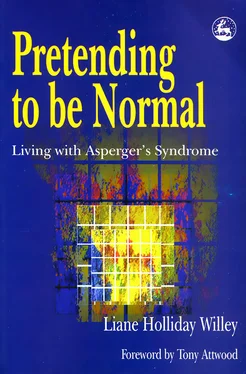Liane Holliday Willey - Pretending to be Normal
Здесь есть возможность читать онлайн «Liane Holliday Willey - Pretending to be Normal» весь текст электронной книги совершенно бесплатно (целиком полную версию без сокращений). В некоторых случаях можно слушать аудио, скачать через торрент в формате fb2 и присутствует краткое содержание. Город: London, Год выпуска: 2000, ISBN: 2000, Издательство: Jessika Kingsley Publishers, Жанр: Психология, Биографии и Мемуары, на английском языке. Описание произведения, (предисловие) а так же отзывы посетителей доступны на портале библиотеки ЛибКат.
- Название:Pretending to be Normal
- Автор:
- Издательство:Jessika Kingsley Publishers
- Жанр:
- Год:2000
- Город:London
- ISBN:1 85302 577 1
- Рейтинг книги:4 / 5. Голосов: 1
-
Избранное:Добавить в избранное
- Отзывы:
-
Ваша оценка:
- 80
- 1
- 2
- 3
- 4
- 5
Pretending to be Normal: краткое содержание, описание и аннотация
Предлагаем к чтению аннотацию, описание, краткое содержание или предисловие (зависит от того, что написал сам автор книги «Pretending to be Normal»). Если вы не нашли необходимую информацию о книге — напишите в комментариях, мы постараемся отыскать её.
Pretending to be Normal — читать онлайн бесплатно полную книгу (весь текст) целиком
Ниже представлен текст книги, разбитый по страницам. Система сохранения места последней прочитанной страницы, позволяет с удобством читать онлайн бесплатно книгу «Pretending to be Normal», без необходимости каждый раз заново искать на чём Вы остановились. Поставьте закладку, и сможете в любой момент перейти на страницу, на которой закончили чтение.
Интервал:
Закладка:
4
A Slow Walk Home
Will I know where to go if I find the way?
Will anything change or will things always he the same?
It doesn’t really matter to me if I am here or there
or somewhere in between,
so long as I know where I am going.
When I hit my mid-twenties I was somewhere between the bright new college graduate and the slightly off-beat lady who talks to pigeons in the park. Truth is, I was both. By then I was fully aware that I would need to mask myself, as best I could, according to the set of circumstances that sat before me. I knew for instance, that I could not talk to myself during a job interview. I knew I would have to dress a certain way in order not to evoke long stares. I understood that it was inappropriate around certain circles to bring up the fact that my home was a zoo filled with dogs and cats. I was beginning to see life more objectively, to realize that though I did not see the purpose in most rules, or more important, the harm in my breaking so many of them, I needed to follow them as best I could. Occasionally I would find someone who would let me make things up as I went along but for the most part I knew people expected me to merge with them as inconspicuously as possible. By my twenties I knew these premises were true; trouble is, I still did not have the mechanisms to comply as often as I might have.
Shortly after I completed my master’s degree, I moved from the relatively safe harbor of my college town to Houston, Texas; an overwhelming city by anyone’s standards. I had no plan when I moved there, no reason for being there, other than to be near my future husband — a plan that did little to prepare me for my life there. I think my new degree from college must have fortified me with flawed confidence leading me to think that if I could finish a post graduate degree, I could accomplish any goal I set my mind on, including living on my own in a rather foreign and engulfing environment. I remember thinking my degree would afford me a great deal of respect in the career market, though I had no idea which career I would ultimately pursue. I thought I would be welcomed by any number of professions, even those beyond my field of multi-media. I was more than naive. I was short sighted and still very vulnerable to the AS traits that kept me confused. Still, I was stronger than I ever had been, and so, not totally without reasonable odds for some kind of success. As it turned out, I was offered the first job I applied for, and though I did not know it at the time, it was probably the only job beyond freelance writing that would suit me well. Two weeks after I arrived in Houston, I accepted a job as an instructor at the University of Houston.
I do not know if teaching at the college level appealed to me more because of the freedoms it gave me, or because it did not require me to make much of a change in the routines I had established as a college student. Everything about teaching college classes was as good as or better than, the best parts of attending them. I liked the structure of the courses, but also the spare time in between. I enjoyed the studying and the lecturing and the new knowledge I found each time I turned a page in my textbooks. And I most enjoyed the very casual and temporary teacher-to-student relationships. They were the perfect kinds of friendships for me.
Everything about my job was darn near perfect, except for one crippling element — the school’s physical location. Unfortunately, the campus I worked on was located in a terribly busy and overcrowded urban area; a nightmare I had to contend with day in and day out. I was never able to find my way to school without first getting lost in some capacity, be it driving the wrong way down a one way street or missing my exits or following the wrong detours. To make matters worse, I drove a mini-station wagon that did not have an automatic transmission or air conditioning; in other words, a vehicle that did very little to comfort me in the hot and humid Houston weather. All these elements forced my sensory integration dysfunction into a high state of chaos. Without fail, I would arrive at the university sweating, sticky, anxious, dazed and confused. Luckily, my interest in teaching students and the college campus environment usually carried me beyond the brink, so that after my sensory systems defrosted, I completely loved my job. Until the day everything changed.
In an attempt to avoid the tangled web of too many sensory overloads — the mass confusion and terrible noise that ride with traffic jams, the sticky weather, the worrying over getting to work on time — I decided to leave for the university at the crack of dawn. While this change in my routine helped me to avoid my most obvious paralyzing AS trait, it catapulted me directly into another AS trap. The trademark of AS. Social impairment.
I loved being on campus by 6:3 in the morning. I relished the emptiness of the university, the linear hallways that broke from their straight lines into square rooms with neat rows of desks and chairs. I liked the order that stood in the buildings when students were not filling them with gab and shuffling feet and too many patterns and colors. I liked the stillness. I also liked the solitude. In the hushed university, I unwound from the drive and let my ears rest on nothing. I relaxed. I felt safe and in control, soothed by the knowledge that my sensory system would eventually settle in response to the silence. I did not realize that though my sensory system was no longer vulnerable to an assault, the rest of me was.
I remember making my way to class one particular morning just as I always had, with my coffee raised for sipping, my paper under my arm waiting to help me pass the time, and my fat backpack laying its weight across my shoulders. With all my objects in tow, I felt balanced and grounded. Normally, I would have stayed that way — nice and balanced — until my students came in. But on this day, I had a visitor. I recall sitting at my desk reading the paper, when a man I had never seen before came into the room. I noted the early hour but gave little thought to why he might be on campus so soon before class was to begin. After all, I did the same thing. I noticed the man was older than most of the students and I remember thinking he was dressed differently than the college kids tended to dress. He was not wearing jeans or dressed as if he was looking for a date. He was dressed in ragged, mud-colored pants and a too worn flannel shirt that faded up and into his ashen, leathered face. Still, I was not particularly alarmed, only annoyed by the look of him. I can still hear the voice he used when he spoke to me. He spoke in a monotone, keeping cadence with the pace his feet kept as he slowly made his way to me. I had yet to stop and worry about his presence in my classroom. I was more curious, more intrigued by the effect he had on my quiet room, than I was by the possible effect he could have on my safety. He told me he had been in jail, that he had just been released. A tiny bell sounded in my thoughts to alarm my suspicions, but I barely heard it. I was simply too engrossed by his moldy appearance to make much of a decision about his possible motives.
Ironically, though it was my AS that kept me from understanding this man was oddly misplaced at the best, and harmful at the worst, it was also my AS that helped me to realize I was in trouble. The tiny bell turned into a blaring alarm the moment he came within an arm’s length away from me. I am disturbed anytime anyone breaks my personal space rule, but in this case, I was mortified. Not scared as much as disgusted, though I might have been more frightened than anything else, if he had not smelled so offensively. Logically, I think I always knew he was not a student or just a friendly person who happened by. I am sure I knew he was not someone I needed to be around. But until he and his smell aggravated my personal space, I really did not depend much on my logic.
Читать дальшеИнтервал:
Закладка:
Похожие книги на «Pretending to be Normal»
Представляем Вашему вниманию похожие книги на «Pretending to be Normal» списком для выбора. Мы отобрали схожую по названию и смыслу литературу в надежде предоставить читателям больше вариантов отыскать новые, интересные, ещё непрочитанные произведения.
Обсуждение, отзывы о книге «Pretending to be Normal» и просто собственные мнения читателей. Оставьте ваши комментарии, напишите, что Вы думаете о произведении, его смысле или главных героях. Укажите что конкретно понравилось, а что нет, и почему Вы так считаете.












